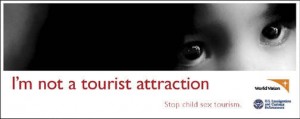What do the countries of India, Mexico, Thailand, Cambodia, and Brazil have in common? You could say rich histories, luscious and picturesque landscapes, succulent foods and colorful settings. Hidden beneath these vacationers’ paradise; however, is a cloak of secrecy that is a concealing a dark reality. These locations are not only a tourists dream, but a perpetrators fantasy. These locations have been identified as the main hotspots for CST, which stands for child sex tourism.
Approximately 2 million children around the world are affected by this multi-billion dollar nightmare. It is estimated that 1/3 of individuals prostituted in Cambodia are children; in Thailand, the number is almost half. This business is mostly funded by men who travel from developed nations, like the United States, Australia and Canada. It is sad to call it a business, but for those who pay for this service, it is simply a transaction. For the minors involved; however, it is much more costly. It signifies the loss of innocence, of safety, and adds an exposure to psychological trauma and distress, diseases and unwanted pregnancy. This is situation where the vulnerable are exploited. Most times, children are coerced into these situations due to poverty in their home country or the need to survive.
dollar nightmare. It is estimated that 1/3 of individuals prostituted in Cambodia are children; in Thailand, the number is almost half. This business is mostly funded by men who travel from developed nations, like the United States, Australia and Canada. It is sad to call it a business, but for those who pay for this service, it is simply a transaction. For the minors involved; however, it is much more costly. It signifies the loss of innocence, of safety, and adds an exposure to psychological trauma and distress, diseases and unwanted pregnancy. This is situation where the vulnerable are exploited. Most times, children are coerced into these situations due to poverty in their home country or the need to survive.
So why does it happen? A common reason given by the perpetrators is that it is a mutually-benefiting situation.
“On this trip, I’ve had sex with a 14 year-old girl in Mexico and a 15 year-old in Colombia. I’m helping them financially. If they don’t have sex with me, they may not have enough food. If someone has a problem with me doing this, let UNICEF feed them.” –Retired U.S. Schoolteacher .
Studies have found that the true reasons behind child sex tourism are a combination of the following:
- Belief that the younger the child, the cleaner, or less likely to expose the person to diseases like HIV or AIDS
- Belief that the buyer will not be prosecuted in their home country or that it is legal in the country that they are visiting
- Knowledge of cultural practices that exacerbate the demand for children for sexual practices
The internet also provides a forum where individuals can share information on destinations and methods of securing that which they are looking for abroad. Additionally, sex tour travel agents guide individuals through the process of booking this type of vacation. According to the United States Department of Justice, in 1995, there were over twenty-five businesses in the United States that offered sex tours. One particular website promised nights of sex “with two young Thai girls for the price of a tank of gas.”
The good news is that at least three dozen countries have extraterritorial laws that allow their citizens to be prosecuted specifically for child sexual abuse committed while abroad. This includes the United States, which in 2003 passed the PROTECT ACT. Under the PROTECT ACT, it is a federal crime for a U.S. citizen or permanent resident to engage in sexual conduct with a minor while traveling abroad. The penalty at this point is 30 years imprisonment.
A global Code of Conduct for the Protection of Children from Sexual Exploitation in Travel and Tourism was created in 1999. As of June 2005, 200 travel companies from twenty-one countries had signed the code. Cynthia, a fellow SISGI blogger wrote on this effort in her piece titled Adopting “The Code” to Combat Child Sex Tourism .
So what can we do? While this seems to be a world away, we can each do something to stop the continuous exploitation of children around the globe. We can start by supporting the companies who have adopted the code of conduct mentioned above. They are household names and our support will show those who have not adopted this standard, how we as consumers hold our companies accountable. It’s a small step, but if each of us takes a step, we can make a bigger impact. More information on this initiative can be found by clicking on this link .



2 pings